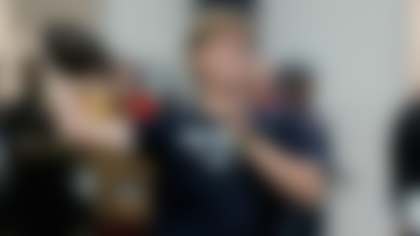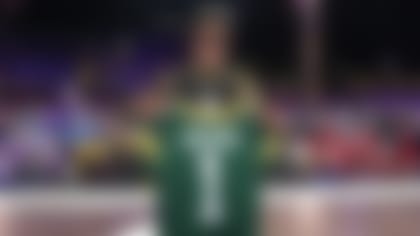By Bill Bradley, contributing editor
For the past four years, 19 NFL stars have gone on camera to talk about their past battles with bullying while meeting a child who has had similar issues. Those scenes have been filmed for a documentary special called *NFL Characters Unite.*
The annual project was created by executive producer Charlie Ebersol, son of famed NBC sports producer Dick Ebersol. The latest version of *NFL Characters Unite airs Friday at 7 p.m. ET on USA Network.*
Ebersol talked with NFL Evolution on Thursday about the origin of the project, the selection of the players and what he hopes the documentary says to people.
Are you a football fan and if so what's your favorite team?
You could probably consider me a football fan. That would be a fair statement. I have been a lifelong fan of the NFL, but as the son of a television executive, I was never really allowed to have team favorites. I'm a very big fan of the New York Giants, in part from where I grew up. But I think part of the reason this documentary even happened was because I was always raised to love players. The Manning family has always been an amazing family and we've been very fortunate to be close with them. A lot of the players featured in this documentary are people that I've gotten to know. I've come to learn that I love individuals.
How did you get involved in this project?
I approached the NFL about doing it about four years ago because I had done work with the Characters Unite campaign that USA Network has done to fight domestic violence, bullying and discrimination and hate. I went to the NFL and said, "Hey, I've had these relationships with these players for so many years and learned some of their stories. A lot of them faced the very problems that kids face in their hometowns and all over the country. Wouldn't it be amazing if we could convince the players to meet kids who are going through what they went through?" The NFL to its credit was all over this. The last four years, the league and I and USA Network have worked together to bring it to life. It has been an incredible experience.
How is it different working on this project than other reality shows you produce?
When we started this company, my mission statement – which is still true today – was that we would only create content that would create joy and happiness and change. Within the context of that, this show is a direct reflection of that. I think as far as the other stuff we produce, it's in line with what we do. I think what's special about this is that because of what USA Network and the NFL put behind it, we don't just reach the kids we are working with every day. Many kids in the country will watch this at their local YMCA and YWCA (on Friday) when it premieres as part of this whole anti-bullying, anti-discrimination program that Characters Unite has launched. I think it will be incredibly powerful.
Again this year, you have some pretty big names for this documentary: Seattle Seahawks coach Pete Carroll and cornerback Richard Sherman, Kansas City Chiefs running back Jamaal Charles, Philadelphia Eagles running back Darren Sproles and Buffalo Bills defensive end Mario Williams. What led to these athletes being chosen?
They came to us, actually. The first year we did this, I didn't know how many players would really be willing to share their stories. I was very thrilled to find out people like Tony Gonzalez, Tony Dungy, Jimmy Graham and Hines Ward all jumped on the opportunity. This year was incredible because we got phone calls from Jamaal's group and Mario Williams' group and Darren Sproles'. And then Richard was a surprise. We were talking to Pete Carroll for a little while and the Seahawks called us back and said, "Hey, we know you want to do something with Pete Carroll, but Richard just came to us and asked if he could do it." We started talking to him and it was an amazing experience. I will say, and I say this in the context that I believe (New England Patriots owner) Bob Kraft's organization is one of the most charitable on earth – the Seahawks are an incredible organization. From the top down, their players are empowered by Pete largely and by the management to go out and really help communities. Our opportunity to go up to Seattle and spend a day with them and watch them do that, then also watch Richard connect with Tevin, was a very powerful experience.
The examples of bullying the players see in this year's "Unite" are unique but relatable: From a girl who was ridiculed for her stutter to a boy whose father is jailed. What led you to these kids?
The show is run by a woman who has worked for me for almost nine years. Her name is Fairouz (El-Baz). Fai every year around September disappears from my offices. About six weeks later she shows back up and says, "I've found these kids who relate to the players' stories." She goes to the cities. She meets the families. She meets hundreds and hundreds of kids. The stories that pop up for us are the ones that we really see direct parallels between what Jamaal Charles went through or what Mario Williams went through or what Darren or Richard went through. These connections are oftentimes lifelong bonds. Some of our players still talk to their kid every week in what has almost become like a big brother program. … I think the most amazing part is when we went back to them and said, "Hey, can we do follow-up stories?" The player and the kid both said this is our personal relationship now. We really don't want to publicize it. I respected that even more than anything I could have possibly imagined.
One of the most poignant parts of this year's documentary was Darren Sproles' patience with the girl who had a speech impediment.
I love that story and I love that girl. She's so amazing. Darren has a stutter. Darren over the years has learned to manage his speech patterns so that it doesn't come out that much. That relationship was an incredible bond. We were all just sitting back slack-jawed as it was happening. You never really know what the connections are going to be like, but it was great.
What strikes you most about the way these athletes interact with the kids?
I'll give you an example. Mario Williams when he met Sophia, you couldn't possibly have two people that have less in common. She's a 9-year-old girl who weighs about 30 pounds or whatever and he is a 20-something mountain of a man. He lost his brother-in-law during the wars of the last couple of years. She lost her father in the same war. He said, "Before every game when they sing the National Anthem, I close my eyes and say a little prayer to the flag because I see my brother-in-law in the flag." She kind of straightened up and looked and him and said, "Wow, that's incredible. I do the same thing. I do it for my dad every day when we do the Pledge of Allegiance." It was something about the imagery that they had both conjured up that their loved ones were literally embodied in the flag. It was a powerful moment. I think it represented something that is an intangible in a show like this: If you do your job and you put together two people who have similar life experiences in a room together, the connections that are going to come out of it are never going to be the thing you expect.
Now in its fourth year, what do you hope people take away from this year's NFL Characters Unite?
I want to people to recognize that they're not alone. That the problems that we face, that the things we think are unique to us – bullying, discrimination, domestic violence – we're not the only people who are going through it. Some of those people are our heroes, like Jamaal Charles or Richard Sherman or whoever. But if you have an experience and you share that experience with other people, then it doesn't just help you. It helps people you talk to, because odds are they've gone through something similar. If Characters Unite is nothing but a catharsis for people who have been through things and are able to talk about it, then it's a big win for me.
The bigger version of it is we've been able to work with the YMCA and the YWCA. We've created lasting programs that can help facilitate the conversions and help bring – especially children but also adults – out of the darkness and into the light. A lot of times I think the healing process is predicated on that.



